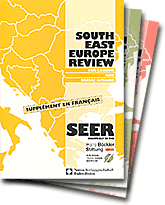
We kindly inform you that, as long as the subject affiliation of our 300.000+ articles is in progress, you might get unsufficient or no results on your third level or second level search. In this case, please broaden your search criteria.



Based on Gadammer, Heidegger and Nietzsche, the author is analyzing the trends in contemporary Serbian poetry, emphasizing its aesthetic downfall, self-centeredness and localization. The author is particularly emphasizing recent strive to institutionalize those tendencies through new anthology that would further this erosion through re-evaluation through negative re-evaluation of the poetic legacy of the twentieth century. This tendency is illustrated with the examples from contemporary Serbian poetics.
More...





In this paper the author tries to determine the extent of accuracy of data entered into the electronic database on registered confiscated property and subsequently demonstrate that restitution of property does not endanger any state or public interest but leads to the establishment of responsibility for individual existence. The author believes that confiscated property registered in the database, which would be subjected to restitution, is significantly smaller (bearing in mind all types of confiscated property) from the overall confiscated property of all types as well as from all types of disposable (previously confiscated) state owned property (mostly part of the monopolies). The principle of replacing (previously confiscated property) which does not exist anymore for some other state owned property (of the same market value) is fully possible and it is legally, economically and socially justified. It encourages the establishment of social and personal responsibility for private property. The author demonstrated that it is not necessary to burden the state budget by issuing the state securities, which would replace the process of property restitution. It would be at the same time financially, socially and politically damaging for the society and the state as well as it would result in having a public debt as a burden for society as a whole.
More...
The law on restitution is just one of the unfulfilled promises of the parties of civic orientation. After October 2000 all the governments avoided its mentioning and hence were postponing this complex problem. The author analyses the reasons for delaying denationalization in Serbia and identifies strong pressure groups interested in maintaining status quo, expenses and complexity of the process and the strength of anti-liberal ideologies of nationalism and socialism as core reasons. The author analyses this lingering pace through the criticism of the Draft Law on denationalization, pointing out its basic weaknesses. He emphasizes that in the current form, the draft is neither meeting the requirements of the prior owners, nor the tax payers, and it does not contribute to the strengthening of notion of the sanctity of property.
More...




Among the many difficulties that south-east European societies face, there are but two major obstacles which cause significant harm both to the socio-economic development of the region and to its path to unity within the continent. These are: corruption; and organised crime. This article will explore, at a rather theoretical level, the correlation between corruptive behaviours and development. It will then examine current trends in corruption and organised crime in south-east Europe and explore and offer some strategies as to how to dismantle the political-criminal power structures throughout the region.
More...
This article aims at encompassing the Romanian context but from a different perspective. In a post-communist setting, which I would characterise as fragile in terms of its socio-economic development, EU requirements have induced a supplementary adaptation pressure concerning compliance with specific requirements in the area of employment and social policy. Thus, this article aims to discuss some developments affecting labour actors in the light of the European integration process. Moreover, the purpose of the article is to explore the responses that trade unions have provided and what they still have to provide in response to the EU pressure for adaptation, as well as how trade unions have been learning to face the challenges of European integration. I consider that, if from a legal and institutional point of view trade unions seem to have incentives for taking part in the transposition of EU demands, de facto the reality is much more complex and the responses diverse. In line with Coen and Dannreuther (2003), in this article, I am interested in analysing in which manner Europeanisation as a ‘guiding principle’ allows for ‘interpretation and incorporation’ by national trade unions. I will refer more precisely to the opportunities created by European integration and the use that trade unions make of the complex mechanisms that impact not only on the national level, but also on the sectoral and local level of interest representation. My research is based on fieldwork realised in Romania as well as on the study of primary sources.
More...

The main hypothesis of this article is that the privatisation of state-owned capital defined the structure and plotted the course of all social changes in eastern Europe after 1989. Using so-called ‘expert projects’, all the mechanisms of social restructuring have been employed to serve monopolistic capitalist capital formation. A multitude of political manipulation and domination technologies have also been used to this end. The ‘national (sovereignty) revival’ technology was instrumental in providing social consensus between the working class and the (communist) nomenclature which, according to the paradox of historical bifurcations, initiated the restoration of private ownership in ‘real socialist’ countries.
More...
This article analyses the underlying processes of EU enlargement towards south-eastern Europe. An exposition of key moments of this process will be given, in addition to appraising and examining all relevant policies and mechanisms designed to encourage EU enlargement. In order to facilitate an easier, more complete and broader comprehension of the process of enlargement towards the south-east, an overview of the enlargement process towards earlier incomers from central and eastern Europe will also be offered. The article will also appraise the most recent trends in the enlargement process and its challenges and perspectives. An appraisal of mutual perceptions (the EU and those of south-east European countries) is also provided. The main focus, however, will be maintained on fundamental issues, such as the unresolved political disputes in the region and economic and political co-operation between the countries of the region.
More...